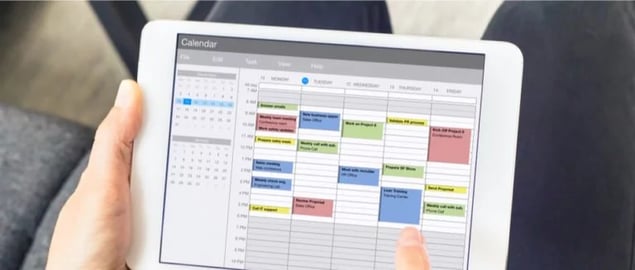People often complain about not having enough time, as if bellyaching would somehow cause the Universe to grant them a twenty-eight-hour day. Rich or poor, successful or struggling, you have the same twenty-four-hour budget as every other person on Earth. If you can’t make that budget work, chances are that you either waste a lot of time or you have overcommitted yourself in one or more categories.
One way to escape from being overcommitted is by learning to say “no” and meaning it, putting guardrails around your time. Any time you spend on things that don’t contribute to what you want moves you further away from your goals and dreams. A second way is to group as many items as possible under a global problem, something for which you can create a solution that addresses the issue going forward.
The villains that waste your time include a social-media-fueled demand for novelty, interruptions that pull your attention away from what’s essential, and an open inbox that continually pings you to let you know that someone is communicating something (or more often, nothing) to you. Add notifications from a “smartphone,” a tool that seems to reduce our individual and collective intelligence, and you have a recipe for doing nothing worthwhile.
Whether your main problem is overcommitment or wasting time, one strategy for making 24 hours feel like enough is to hyper schedule your weeks and days. The idea here isn’t exactly new, but so few practice it that it’s worth a bit of explanation.

Hyper-Scheduling Your Days and Weeks
The idea of hyper-scheduling is to schedule your entire day from start to finish. Before you start worrying about having enough “space” in your day, know that you can—and should—intentionally leave yourself time with nothing scheduled. Calendaring in the most critical tasks to your long-term success and happiness ensures that they receive an appropriate (and out-sized) amount of time and focus. Blocking the time also means it isn’t available for distractions, even the pleasant ones you’d rather allow.
For example, here is how my Sunday starts:
- Morning Journal and Dashboard Update (20 minutes)
- Write Sunday Newsletter (90 minutes)
- Exercise (60 minutes)
- Personal Care (30 minutes)
- Brunch with Cher (90 minutes)
- Write 2,000 words for Sales Leadership Book (120 minutes)
- Nap (30 minutes)
I have intentionally removed any space that might have been available between these tasks for distractions, like my strong desire to know whether the Clemson linebacker broke Justin Fields’ ribs and the giant stack of new books on my desk just begging me to open them. Books don’t write themselves, and it’s a priority, so it gets scheduled.
My Best Advice on Hyper-Scheduling
- Start by identifying the highest-value activities and outcomes. You must have clarity about what you want and what you need to do to get it to schedule your vital tasks.
- Don’t commit to blocks of longer than 90 minutes. If you find that you struggle to concentrate for that long, lower the limit to 60 minutes.
- Use your first block of time each day on the most crucial outcome you need to create. Don’t allow small things to steal time from your big goals. The idea of a “priority” is a singular goal that comes before everything else, so the word priorities is a sort of a misnomer.
- Don’t open your email inbox or your browser first thing in the morning. Instead, plan to review your email after you finish your first scheduled block. If you can get two blocks completed before you open your email, you’ll often get more done in those two blocks than you do in a typical day—and that your email can and will wait.
- Schedule white space every day. The way to accomplish more isn’t to fill every minute with work; it’s to make progress on the most important things. When you grind on your work, you are also grinding yourself down. There is no reason not to have a couple of hours blocked off for whatever shows up in your world.
- Schedule the white space for the times you usually lose focus. You might want one block in the morning and a larger block in the afternoon, if that is when your energy wanes.
- Prioritize the time you need for the most important relationships in your life. You only get one ticket for this ride, and there are no do-overs.
- If you struggle to keep your focus, don’t give up. Instead, get up, walk around, get a drink of water, and then start wherever you left off. Avoid giving in to the temptation of Instagram, ESPN, or in my case, Amazon.com.

Occasionally, you will fail and fall off hyper schedule. Don’t worry about it, and don’t attach any negative meaning to what’s just one event. Just start again and give yourself time to adjust. For those of you who keep 36 tabs and two inboxes open, I pray that you see the light (though you probably won’t). Meanwhile, go ahead and schedule 30 minutes for hyper hours to fall down the rabbit hole a couple of times a day, even though, I promise you, you are not missing anything.
You have 8,760 hours to work within a year. Other than creating the elusive 25-hour day, you have plenty of time to create any outcome you can imagine. I am budgeting 90 hours to write my fourth book, at 1,000 words an hour given a strong outline. Embracing hyper hours effectively can make all the difference in reaching your goals efficiently.
What will you accomplish in the first three months of 2021, and when will you do it?

Get the Free eBook!
Learn how to sell without a sales manager. Download my free eBook!
You need to make sales. You need help now. We’ve got you covered. This eBook will help you Seize Your Sales Destiny, with or without a manager.
Download Now







.jpg?width=768&height=994&name=maximize-productivity-ebook-v3-1-cover%20(2).jpg)


